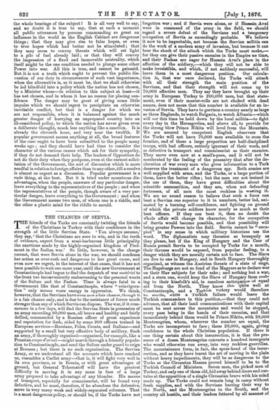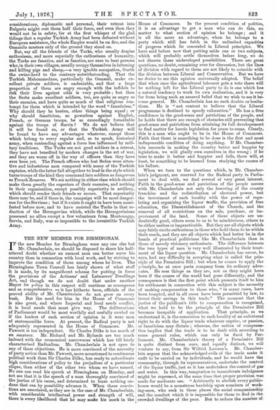trail CHANCES OF SERVIA. T HE `friends of the Turks are
constantly twitting the friends of the Christians in Turkey with their confidence in the strength of the little Servian State. ' You always assume,' they say,' that the Christians are sure to win, and in the teeth of evidence, expect from a semi-barbarous little principality the exertions made by the highly-organised kingdom of Pied- mont in the Italian war.' So little, however, is the charge correot, that were Servia alone in the war, we should condemn her action as over-rash and dangerous to her great cause, and even now we regret, in the interest of that cause, that it has not been possible to wait one more year, until the new Government at Constantinople had begun to find the despatch of war materiel to the front too inconveniently embarrassing to the personal wants of the Sultan and the Pashas. Time is always fatal to a Government like that of Constantinople, where " reinvigora- tion " only means more energy in oppression. We think, however,that the Servians have even now a fair chanca,tbangh it is a fair chance only, and is due to the assistance of forces much .stronger than any of which Servia can dispose. The war, if it com- mences in a few days, will find the Servian State in possession of an army exceeding 80,000 men, all brave and healthy and fairly drilled, commanded by a Russian officer of great experience and reputation for dash, aided by some 200 officers trained in European services—Russians, Poles, Croats, and Italians—and supported by a small but very effective body of artillery. Such an army, if thoroughly organised—organised, for example, like a Prussian corps d'armie—might march through a friendly popula- tion to Constantinople, and send the Sultan under guard to reign at Broussa ; but there is no such organisation. The Servian Army, as we understand all the accounts which have reached us, resembles a Carlist army—that is, it will fight very well in its own province, or in Bosnia, or with great advantages of ground, but General Tchernaieff will have the greatest difficulty in moving it in any mass in face of a large army prepared to take advantage of any blunder. His means of transport, especially for commissariat, will be found very defective, and he must, therefore, if he abandons the defensive, move in very many weak and widely-separated columns. That is a moat dangerous policy, or should be, if the Turks have not forgotten war ; and if Servia, were alone, or if Hussein Avni were in command of the army . in the field, we ..ihould regard a severe defeat of the Servians and a temporary occupation of Servia• as exceedingly probable. We believe it now to be improbable, not because the Servian militia can do the work of a modern army of invasion,' but because it can bear the shock of the attack which the Turks must make,— for they can give their passive enemies in the Empire no time, and •their Pashas are eager for Hussein Avni's place in the affection of the soldiery,—which they will not be able to make irresistible, and which, if not suddenly successful, will leave them in a most dangerous position. Our calcula- tion is, that war once declared, the Turks will attack with all their strength the main position of the Servians, and that their strength will not come up to 70,000 effective men. They say they have brought up their army in European Turkey to 200,000 men, but that state- ment, even if their muster-rolls are not choked with dead names, does not mean that this number is available for an in- vasion of Servia. They have to garrison a country nearly as large as three Englands, to watch Bulgaria, to watch Albania—which will not this time be held down by the local militia—to fight every day in the Herzegovina, and above all, to provide for the strong blow Prince Nikita will level from the Mountain. We are assured by competent English observers that the Turks will not have 70,000 men available to cross the frontier, and of these a large proportion are half-disciplined troops, with bad officers, entirely ignorant of their work, and as defective in transport and commissariat as their enemies. They move even now at a snail's-pace, and it will not be accelerated by the feeling of the peasantry that after the de- claration of war every man who gives information to a Turk deserves the treatment of a dangerous spy. Both armies are well supplied with arms, and the Turks, or a large portion of them, have the better rifles ; but the men are not trained in the use of them, they have great difficulties about the scientific ammunition, and they are, when not defending fortresses, of all men the most reckless in wasting it. We see no sound reason to believe that such a force can beat a Servian one superior to it in numbers, better led, ani- mated by a burning self-confidence, and fighting on ground of which the private soldiers know nearly as much as their best officers. If they can beat it, then no doubt the Whole affair will change its character, for the occupation of Servia would become possible, and that possibility will bring greater Powers into the field. Servia cannot be " occu- pied" in any sense in which military historians use the word. The diplomatists may threaten as brusquely as they please, but if the King of Hungary and the Czar of Russia permit Servia to be occupied by Turks for a month, their thrones would be exposed, from popular feeling, to a danger which they are morally certain not to face. The Slays are five to one in Hungary, and in South Hungary thoroughly organised, as witness the Austrian threats of a state of siege. The Hapsburgs are not so fond of the Magyars as to declare war on their Slav subjects for their sake ; and nothing but a war, and a stern one, would keep the Slays of Hungary from ru- ing to their kinsfolk's aid, in emulous anticipation -of equal aid from the North. They know _tia. quite well at Constantinople, and a Turk w. victory would therefore be ebeilie, while a Turkish failure would leave the Turkish commanders in this position,—that they could not advance, that all their land communications with their capital must be sent across the mountains and would be stopped, every pass being in the hands of their enemies, and that immediately behind them would be Prince Nikita, with 28,000 Montenegrins, whom, wherever the number are equal, the Turks are incompetent to face ; these 28,000, again, giving confidence to the whole Christian population. If there is one thing certain about this insurrection, it is that the pre- sence of a dozen Montenegrins converts a hundred insurgents who would otherwise run away, into very reckless guerrillas. The mountaineers form, in fact, the spear-head of the insur- rection, and as they have learnt the art of moving in the plain without heavy impedimenta, they will be as dangerous to the Turks as the Circassian Hassan proved himself to be to the Turkish Council of Ministers. Seven men, the picked men of Turkey, and only one of them old, hid away behind doors and cur- tains at the apparition of a single Circassian bravo with his mind made up. The Turks could not remain long in camp without fresh supplies, and with the Servians barring their way to the North, and the Montenegrins to the South, and the country all hostile, and their leaders fettered by all manner of considerations, diplomatic and personal, their retreat into Bulgaria might cost them _half, their force, and even then they would not be in safety, for at the first whisper of the glad tidings that a regular Turkish Army had been defeated without European assistance, the whole Empire world ,be on fire, and the Osmanlis masters only of the ground they stood on. But, say all the friends of the Turks, who usually despise enthusiasm, and more especially the enthusiasm of humanity, the Turks are fanatics, and as fanatics, are sure to beat persons who, in their own villages, usually occupy themselves in fattening and killing pigs and sheep,—a very ignoble occupation, Gurth the swine-herd to the contrary notwithstanding. That the Turkish Mahommedans, particularly the Osmanli, make ex- cellent private soldiers, is undeniable, and that a large proportion of them are angry enough with the infidels to risk their lives against odds is very probable ; but then the Serbs make excellent soldiers, too, are quite as angry as their enemies, and have quite as much of that religious con- tempt for them which is intended by the word " fanaticism." Why should they be beaten, other things being equal ; or why should fanaticism, so powerless against English, French, or German troops, be so exceedingly formidable against the troops of Servia ? We do not believe that it will be found so, or that the Turkish Army will be found to have any advantages whatever, except those which belong to every regular and, so to, speak, historical army, when contending against a force less influenced by mili- tary traditions. The Turks are not good soldiers in a retreat, they have not benefited by modern changes in the art of war, and they are worse off in the way of officers than they have ever been yet. The French officers who lost Sedan were atten- tive and industrious men compared with many of the Turkish captains, while the latter fail altogether to lead in the style which turns troops of the kind they command into soldiers as dangerous as French Zouaves. We see nothing in either class which should make them greatly the superiors of their enemies, and nothing in their organisation, except possibly superiority in artillery, which should render their friends so secure. That superiority there may be, and if there is, the campaign will be most danger- ous for the Servians ; but if it exists it ought to have been mani- fested before now, and to have assisted. the Turks in that re- duction of the Herzegovina which, while the Herzegovinians possessed no allies except a few volunteers from Montenegro, Servia, and Italy, was so impossible to the irresistible Turkish Army.



































 Previous page
Previous page